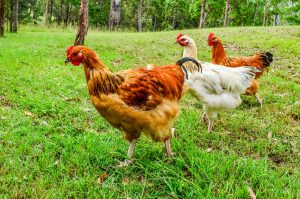Eat healthily! Buy Organic! Choose humane slaughter! Eat cage-free or free-range! Anyone who has turned on a television in the last ten years, opened a newspaper or spoken to another human being, was probably bombarded by these requests at some point. One large push for consumers is to do the right thing by purchasing cage-free chickens or free-range eggs. Unfortunately, the ideas that most individuals have of free-range, are much different from reality.
For most, the image of free-range is of chickens roaming free on a large patch of land, casually wandering into an open coupe with areas perfect for laying eggs. The term free-range conjures up images of sunshine, fresh air, and easy life that, though leading to slaughter, is good for the animal. Unfortunately, this is not likely the reality for those free-range eggs or that free-range fowl waiting in your next meal.

Free Range Fowl Foul
What free-range really means?
In order to become a government-certified free-range for farms raising birds used for food purposes, the bird simply needs access to the outdoors. This does not mean full-time access or that the outdoors contains any type of food source or vegetation at all. In fact, chickens kept in small cages opened for only a few minutes a day, then the farm is deemed free range. This paints free range in a bit of a different light.
Some free-range farms may be free-range, with fowl wandering around forced to search for food and shelter. The regulations are not specific. In fact, many of the horrible practices, such as debeaking hens, happen at both free-range and battery cage fowl farms. In addition, males are typically killed at birth as they have no purpose since they do not lay eggs. Specific to the term cage-free, hens are typically not kept caged, but indoors without a way to go outside. These hens are often left to stand around and lay on wire racks instead of allowed to enjoy the outdoors or a hay-filled coupe. Once it comes time for slaughter birds raised for meat are killed in the same manner regardless of raising.
This is not designed to encourage consumers to become vegetarian or vegan, though that is an option, to help inform consumers overall. Overpaying for free-range or cage-free may simply be a product of good advertising, not actual differences. Will you think twice before searching for those specific words on your eggs? Do you truly know where your food originates?




